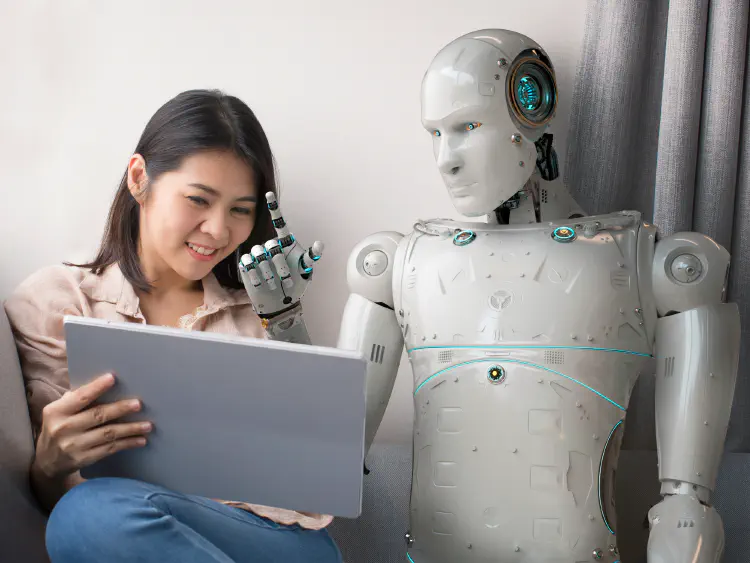Machine Customers: How AI is Redefining Shopping—Is Your Business Ready?
Discover the rise of AI-powered machines that make purchases for us.
- Jay McBride
- 4 min read

We’ve all heard of online shopping and automated payments, but the future is going one step further with machine customers. Imagine your devices being smart enough to shop for you—automatically. It’s not a sci-fi concept; it’s the next big thing in commerce, and it’s predicted to generate trillions of dollars in the coming years.
What Are Machine Customers?
In simple terms, machine customers are non-human buyers—smart devices or algorithms that can autonomously purchase goods or services without human input. These could range from your smart fridge ordering milk when it’s running low to your car booking its own service appointment. By 2028, an estimated 15 billion devices will be capable of doing this, completely changing how commerce operates (DigitalWorld Italia).
How Do Machine Customers Work?
Machine customers work using AI (artificial intelligence) and connected devices. These technologies allow devices to communicate, make decisions, and act on behalf of their owners. For instance, your smart home could recognize that your pantry is low on essential items and place an order with your local grocery store—all without you lifting a finger.
Imagine this: your electric car detects that its battery is low. Instead of you manually searching for the nearest charging station, the car’s system finds the best charging spot, schedules a time, drives itself to the station, and pays for the service—all without your intervention. That’s a machine customer in action.
Real-World Examples
Amazon Dash Replenishment: Devices like smart printers can automatically reorder ink when it runs out. With Amazon’s Dash Replenishment Service, these machines track the levels of supplies and purchase more when needed.
Smart Fridges: These can scan their contents and reorder groceries when supplies are running low. No more remembering to buy milk!
Connected Cars: Your car could detect when it needs servicing, find an available appointment, and even book itself in—all based on pre-programmed rules and without you needing to intervene.
What Does This Mean for Businesses?
For businesses, the rise of machine customers is both a challenge and an opportunity. Companies will need to adapt to this new kind of consumer. Traditional marketing strategies aimed at human decision-making may not work for machines. Businesses will need to develop systems that can interact with these devices and ensure a seamless machine-to-business transaction process.
For instance, businesses could create subscription models tailored to machine customers. If a machine can detect when supplies are low, it makes sense to offer automatic reordering services. Additionally, companies will need to ensure their websites and services are optimized for interactions with algorithms, as machine customers don’t behave the same way as humans when it comes to evaluating options.
How Will This Impact the Economy?
The economic implications are huge. Experts predict that machine customers will generate trillions of dollars in new revenue streams by 2030 (Business Wire) (DigitalWorld Italia). As devices become more intelligent and interconnected, businesses will experience higher efficiency and reduced overhead costs due to autonomous purchasing systems.
Moreover, the efficiency of machine customers could reduce the need for human labor in certain areas, such as customer service and sales, and shift the focus towards maintaining and improving AI systems. The subscription economy is expected to flourish, as recurring orders will be automated by these intelligent devices.
Future Opportunities and Risks
With any new technology, there are risks to consider. One major concern is data privacy and security. Machine customers, like any connected devices, will need to handle sensitive information such as payment details and personal data. Ensuring these transactions are secure and private will be a priority.
On the flip side, machine customers open up a whole new world of possibilities for smart services and automated commerce. Businesses that adapt early will benefit the most, especially in industries like retail, logistics, and home automation.
Wrapping It Up
The rise of machine customers is set to revolutionize the way we shop and interact with services. These autonomous devices will take over everyday tasks like reordering supplies or scheduling services, freeing up our time and making life more convenient. As we head towards a future where machines take on a bigger role in commerce, businesses will need to adapt to cater to this new kind of customer.
Are you ready for your smart fridge to do your shopping? This future is not far off, and it’s set to transform industries in ways we can’t yet fully predict. Machine customers are not just a trend—they’re the next evolution of commerce.
What Do You Think About Machine Customers?
As AI-powered devices take on a bigger role in shopping, the landscape of commerce is shifting. How do you see this trend impacting businesses and consumers? Leave a comment below with your thoughts! Let’s start a conversation about the future of smart shopping and how it will shape our daily lives.

